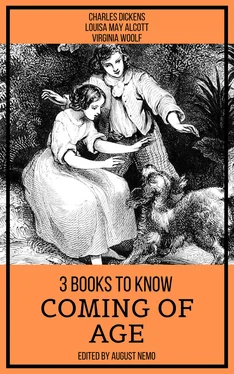The something that I had noticed before, clicked in the man's throat again, and he turned his back. The boat had returned, and his guard were ready, so we followed him to the landing-place made of rough stakes and stones, and saw him put into the boat, which was rowed by a crew of convicts like himself. No one seemed surprised to see him, or interested in seeing him, or glad to see him, or sorry to see him, or spoke a word, except that somebody in the boat growled as if to dogs, "Give way, you!" which was the signal for the dip of the oars. By the light of the torches, we saw the black Hulk lying out a little way from the mud of the shore, like a wicked Noah's ark. Cribbed and barred and moored by massive rusty chains, the prison-ship seemed in my young eyes to be ironed like the prisoners. We saw the boat go alongside, and we saw him taken up the side and disappear. Then, the ends of the torches were flung hissing into the water, and went out, as if it were all over with him.
 |
|
 |

My state of mind regarding the pilfering from which I had been so unexpectedly exonerated, did not impel me to frank disclosure; but I hope it had some dregs of good at the bottom of it.
I do not recall that I felt any tenderness of conscience in reference to Mrs. Joe, when the fear of being found out was lifted off me. But I loved Joe—perhaps for no better reason in those early days than because the dear fellow let me love him—and, as to him, my inner self was not so easily composed. It was much upon my mind (particularly when I first saw him looking about for his file) that I ought to tell Joe the whole truth. Yet I did not, and for the reason that I mistrusted that if I did, he would think me worse than I was. The fear of losing Joe's confidence, and of thenceforth sitting in the chimney-corner at night staring drearily at my for ever lost companion and friend, tied up my tongue. I morbidly represented to myself that if Joe knew it, I never afterwards could see him at the fireside feeling his fair whisker, without thinking that he was meditating on it. That, if Joe knew it, I never afterwards could see him glance, however casually, at yesterday's meat or pudding when it came on to-day's table, without thinking that he was debating whether I had been in the pantry. That, if Joe knew it, and at any subsequent period of our joint domestic life remarked that his beer was flat or thick, the conviction that he suspected Tar in it, would bring a rush of blood to my face. In a word, I was too cowardly to do what I knew to be right, as I had been too cowardly to avoid doing what I knew to be wrong. I had had no intercourse with the world at that time, and I imitated none of its many inhabitants who act in this manner. Quite an untaught genius, I made the discovery of the line of action for myself.
As I was sleepy before we were far away from the prison-ship, Joe took me on his back again and carried me home. He must have had a tiresome journey of it, for Mr. Wopsle, being knocked up, was in such a very bad temper that if the Church had been thrown open, he would probably have excommunicated the whole expedition, beginning with Joe and myself. In his lay capacity, he persisted in sitting down in the damp to such an insane extent, that when his coat was taken off to be dried at the kitchen fire, the circumstantial evidence on his trousers would have hanged him if it had been a capital offence.
By that time, I was staggering on the kitchen floor like a little drunkard, through having been newly set upon my feet, and through having been fast asleep, and through waking in the heat and lights and noise of tongues. As I came to myself (with the aid of a heavy thump between the shoulders, and the restorative exclamation "Yah! Was there ever such a boy as this!" from my sister), I found Joe telling them about the convict's confession, and all the visitors suggesting different ways by which he had got into the pantry. Mr. Pumblechook made out, after carefully surveying the premises, that he had first got upon the roof of the forge, and had then got upon the roof of the house, and had then let himself down the kitchen chimney by a rope made of his bedding cut into strips; and as Mr. Pumblechook was very positive and drove his own chaise-cart—over everybody—it was agreed that it must be so. Mr. Wopsle, indeed, wildly cried out "No!" with the feeble malice of a tired man; but, as he had no theory, and no coat on, he was unanimously set at nought—not to mention his smoking hard behind, as he stood with his back to the kitchen fire to draw the damp out: which was not calculated to inspire confidence.
This was all I heard that night before my sister clutched me, as a slumberous offence to the company's eyesight, and assisted me up to bed with such a strong hand that I seemed to have fifty boots on, and to be dangling them all against the edges of the stairs. My state of mind, as I have described it, began before I was up in the morning, and lasted long after the subject had died out, and had ceased to be mentioned saving on exceptional occasions.
At the time when I stood in the churchyard, reading the family tombstones, I had just enough learning to be able to spell them out. My construction even of their simple meaning was not very correct, for I read "wife of the Above" as a complimentary reference to my father's exaltation to a better world; and if any one of my deceased relations had been referred to as "Below," I have no doubt I should have formed the worst opinions of that member of the family. Neither, were my notions of the theological positions to which my Catechism bound me, at all accurate; for, I have a lively remembrance that I supposed my declaration that I was to "walk in the same all the days of my life," laid me under an obligation always to go through the village from our house in one particular direction, and never to vary it by turning down by the wheelwright's or up by the mill.
When I was old enough, I was to be apprenticed to Joe, and until I could assume that dignity I was not to be what Mrs. Joe called "Pompeyed," or (as I render it) pampered. Therefore, I was not only odd-boy about the forge, but if any neighbour happened to want an extra boy to frighten birds, or pick up stones, or do any such job, I was favoured with the employment. In order, however, that our superior position might not be compromised thereby, a money-box was kept on the kitchen mantel-shelf, in to which it was publicly made known that all my earnings were dropped. I have an impression that they were to be contributed eventually towards the liquidation of the National Debt, but I know I had no hope of any personal participation in the treasure.
Mr. Wopsle's great-aunt kept an evening school in the village; that is to say, she was a ridiculous old woman of limited means and unlimited infirmity, who used to go to sleep from six to seven every evening, in the society of youth who paid twopence per week each, for the improving opportunity of seeing her do it. She rented a small cottage, and Mr. Wopsle had the room up-stairs, where we students used to overhear him reading aloud in a most dignified and terrific manner, and occasionally bumping on the ceiling. There was a fiction that Mr. Wopsle "examined" the scholars, once a quarter. What he did on those occasions was to turn up his cuffs, stick up his hair, and give us Mark Antony's oration over the body of Caesar. This was always followed by Collins's Ode on the Passions, wherein I particularly venerated Mr. Wopsle as Revenge, throwing his blood-stained sword in thunder down, and taking the War-denouncing trumpet with a withering look. It was not with me then, as it was in later life, when I fell into the society of the Passions, and compared them with Collins and Wopsle, rather to the disadvantage of both gentlemen.
Читать дальше















